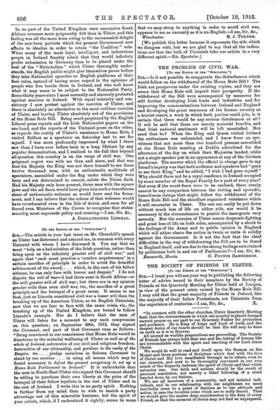THE PROBLEM OF CIVIL WAR.
[To THE EDITOR OP TES " SPECTLTOR."] SIE,—IS it not possible to exaggerate the disturbances which would follow on the withdrawal of the Home Rule Bill ? The Irish are prosperous under the existing regime, and they are aware that Home Rule will imperil their prosperity. If the withdrawal of the Bill were accompanied by measures for still further developing Irish trade and industries and for improving the communications between Ireland and England and developing the great resources of the former country as a tourist resort, a work in which both parties could join, is it certain that there would be any serious distubances at all ? It will be said that these are merely material benefits, and that Irish national sentiment will be left unsatisfied. But need that be ? When the King and Queen visited Ireland the enthusiasm was unbounded, and I know from an eye- witness that not more than two hundred persons assembled at the Home Rule meeting at Dublin advertised for the afternoon of the day on which their Majesties landed, while not a single speaker put in an appearance at any of the thirteen platforms. The answer which the official in charge gave to my friend's inquiry was that both audience and speakers had " gone to see their King," and he added, "I wish I had gone myself." Why should there not be a royal residence in Ireland occupied by some member of the Royal Family for a part of every year? But even if the worst fears were to be realized, there surely cannot be any comparison between the rioting and sporadic, tumultuous risings that might follow the withdrawal of the Home Rule Bill and the steadfast organized resistance which it will encounter in Ulster. The one can easily be put down without much loss of life on either side, nor would it be necessary in the circumstances to punish the insurgents very severely. But the coercion of Ulster means desperate fighting and great loss of life on both sides, accompanied by a shock to the feelings of the Army and to public opinion in England which will either cleave the nation in twain or unite it solidly against the Government. Is it not the fact that the chief difficulties in the way of withdrawing the Bill are to be found in England itself, and are due to the strong feelings entertained by politicians both in and out of Parliament P—I am, Sir, &c.














































 Previous page
Previous page